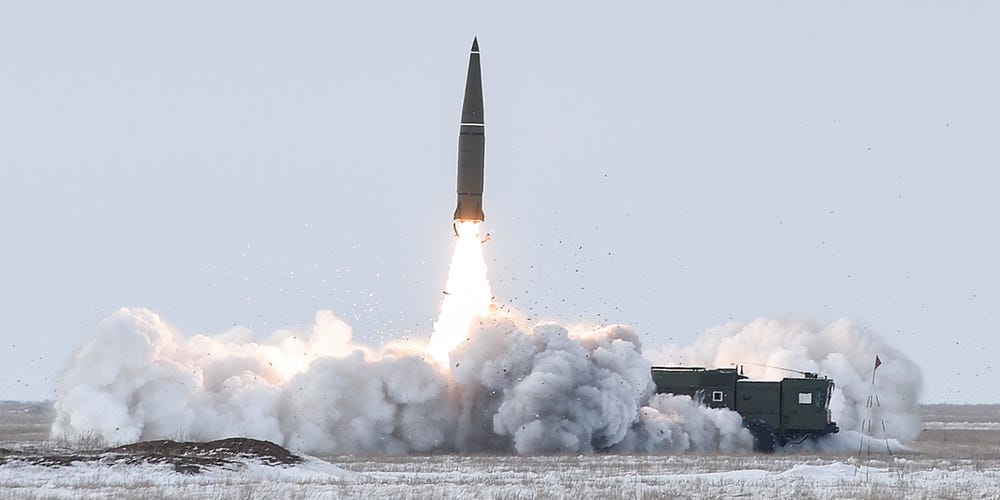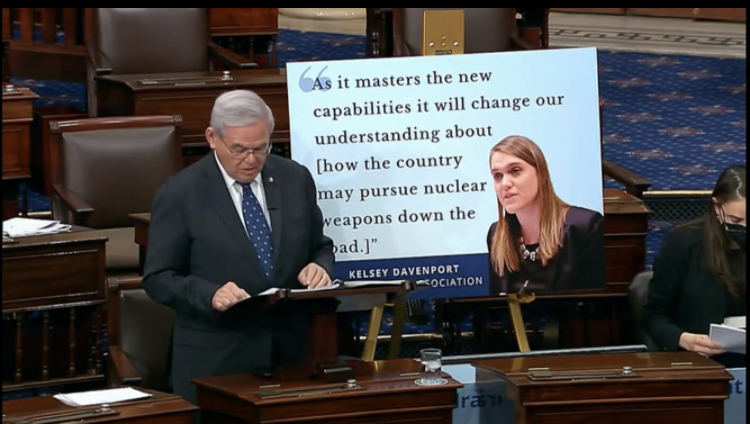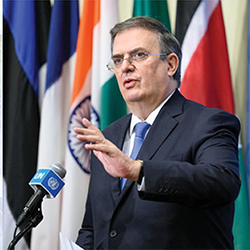Inside the Arms Control Association
February 2022
The Role of Arms Control in U.S.-Russian Relations
The ongoing major Russian military buildup around Ukraine creates the potential for a catastrophic war that can and must be avoided through serious and deft diplomacy.
 Among the many factors that have led us to this point is the breakdown of important conventional and nuclear arms control agreements that helped bring an end to the first Cold War. These crucial guardrails, including the Conventional Forces in Europe Treaty, the Open Skies Treaty, the ABM Treaty, and the INF Treaty, are no longer in effect. As a result, trust in each others’ intentions has eroded, concerns about military capabilities have grown, and the risk of miscalculation is higher.
Among the many factors that have led us to this point is the breakdown of important conventional and nuclear arms control agreements that helped bring an end to the first Cold War. These crucial guardrails, including the Conventional Forces in Europe Treaty, the Open Skies Treaty, the ABM Treaty, and the INF Treaty, are no longer in effect. As a result, trust in each others’ intentions has eroded, concerns about military capabilities have grown, and the risk of miscalculation is higher.
We are working hard to emphasize how and why U.S. and Russian leaders should elevate action on diplomacy and arms control to help defuse the crisis through their “Strategic Security Dialogue,” and why, given the risks that nuclear weapons pose, a direct confrontation between the U.S./NATO and Russia should be avoided.
Although Russia’s written proposals on certain issues, such as guarantees against further NATO expansion, are “non-starters” for U.S. and NATO leaders, on other issues, there are proposals to address mutual concerns about military capabilities that provide a basis for talks. To the credit of the Biden administration, Washington’s written responses are serious and they show there is room for negotiations designed to resolve mutual security concerns.
In particular, we believe U.S. and Russian leaders can and should negotiate new agreements to scale back large military exercises, avoid close military encounters between Russian and NATO forces, and prevent the deployment of intermediate-range missiles in Europe or Western Russia.
In collaboration with experts in Russia, Europe, and the United States, we are also pointing out that Biden and Putin cannot afford to lose sight of the need to conclude new agreements to further slash their bloated strategic and nonstrategic nuclear forces and set limits on long-range missile defenses by 2025 and before New START expires in early 2026. Otherwise, the next showdown between Russia and the West will be even riskier.
In the nuclear age, the U.S. and Russian leaders have a special responsibility to avert military conflict and to reduce the threats posed by nuclear weapons. Failure is not an option.
Thank you and stay safe,
Daryl G. Kimball,
Executive Director
Talks to Restore 2015 Iran Deal Reach Crucial Juncture
Multilateral negotiations to restore U.S. and Iranian compliance with the 2015 nuclear deal are reportedly making progress. According to senior U.S. officials, the United States and Iran "are in the ballpark of a possible deal" to return to the 2015 nuclear agreement.
Promptly and simultaneously restoring U.S. and Iranian compliance with the JCPOA would help stabilize the current situation and prevent a major nuclear proliferation crisis in the region.
Our team is on the frontlines of the debate, providing detailed information and analysis to reporters and policymakers, and rebutting critics who oppose bringing Iran back into compliance with the JCPOA. To catch up on the latest, see our “P4+1 and Iran Nuclear Deal Alerts” and check out the latest in the March issue of Arms Control Today.

2021 Arms Control Person of the Year Motivated by Honor
Last month, we announced the results of our annual “Arms Control Person(s) of the Year” contest.
 Mexico’s secretary of foreign affairs, Mr. Marcelo Ebrard, and the government of Mexico were selected as the 2021 Arms Control Persons of the Year through an online poll that drew a record number of participants from dozens of countries.
Mexico’s secretary of foreign affairs, Mr. Marcelo Ebrard, and the government of Mexico were selected as the 2021 Arms Control Persons of the Year through an online poll that drew a record number of participants from dozens of countries.
Mr. Ebrard and the government were nominated for their ground-breaking lawsuit in a U.S. federal court that alleges that several major U.S. firearms manufacturers and wholesalers “design, market, distribute, and sell guns in ways they know routinely arm the drug cartels in Mexico.” The companies sell about 340,000 of an estimated half-million guns that illegally flow each year from U.S. states to criminals south of the U.S.-Mexico border, according to the suit.
In an op-ed published in January in The Los Angeles Times, Ebrard wrote that “Receiving such recognition—for which I express my deep and sincere appreciation—gives us even more of an incentive to continue defending the lives and well-being of our people.”
Our Work Depends on Your Support. Thank You!
Thanks to our loyal and generous Arms Control Association supporters, our 2021 revenue from individual members, donors, and subscribers to Arms Control Today, rose by 89% above 2020 levels. We are especially grateful for the generosity of several major individual donors, as well as the stalwart continuing support of many contributors over the years.
If you value our information, news, and analytical resources, please consider making a donation or becoming a member of ACA. You can now make monthly recurring donations or join as a monthly sustaining member.
Donate $5 monthly · Donate $20 monthly · Donate $50 monthly · Donate another amount
Save the Date: Annual Meeting and Celebration of ACA at 50!
Please mark your calendar for June 2, when we will host a one-day Annual Meeting in a “hybrid” conference mode in Washington, D.C.
If public health conditions allow, we will host an in-person gathering at the National Press Club in Washington, D.C., and will welcome online participants from across the globe to celebrate the past, present, and future of the Arms Control Association, which became an independent nonprofit organization in 1972.
Our meeting will include expert perspectives and discussion on pressing arms control issues of 2022, some messages from ACA friends and alumni, and we will look ahead to our plans to strengthen ACA in the years ahead.
Look for more details in the coming weeks on the agenda, logistics, and registration.
ACA and Campaign to Ban Landmines Press White House for Action
Last month, on January 31, 2022, marked the second anniversary of the current U.S. landmine policy. Enacted by the Trump administration in 2020, the policy is still unchanged by the Biden administration. The U.S. Campaign to Ban Landmines and 37 organizations, including ACA, sent a letter to President Biden saying:
"Two years of this reckless and immoral policy is two years too long. We urge immediate action to ban the use of anti-personnel landmines without geographic exceptions, and to set the U.S. on a short direct path to join the Mine Ban Treaty by 2023."
The full text of the letter is available online.
ACA in the News
- On Ukraine, executive director Daryl Kimball told The New York Times, “If a diplomatic solution is not achieved, it will reinforce the impression that nuclear-armed states can bully non-nuclear states,” and thus “reduce the incentives” for disarmament, Feb. 4.
- In a Feb. 4 NBC News story on Iran and sanctions waivers,” Kimball said “These sanctions waivers allow for international cooperation on activities that help reduce Iran’s nuclear potential.”
- Board member and senior fellow Michael Klare penned a powerful essay in the February 21 edition of The Nation titled: "A New ‘March of Folly’ in Europe: Can It Be Averted?"
- In an essay published Jan. 18 in Just Security, Kimball and Ira Helfand of the International Physicians for the Prevention of Nuclear War explain why in the crisis over Ukraine, "All Options Should Not Be On the Table.”
- A Jan. 18 CNN story quotes ACA Research Associate Julia Masterson on the urgency of a mutual return to compliance with the 2015 Iran deal.
- Following a renewed volley of North Korean ballistic missile tests, Kimball told Reuters Jan. 20 that the Biden administration should pursue “more concerted, high-level” efforts to restart negotiations with North Korea.
- A Jan. 12 TIME magazine quotes senior policy analyst Shannon Bugos saying, “the United States and Russia should explore arms control efforts aimed at avoiding” a new arms race as tensions rise regarding Ukraine.
- Kimball helps explain, “How Close Is Iran to Getting a Nuclear Weapon?” in a story in Foreign Policy, Jan. 10.
- Kimball told The Associated Press Dec. 31 that the “very unfortunate” postponement of the NPT Review Conference “should not be used as an excuse not to pursue” necessary disarmament efforts.
In Case You Missed It
- Nov. 17: ACA organized a webinar on “China’s Nuclear Expansion: Challenges, Implications and Risk Reduction Options.”
- Dec. 9: ACA members joined a special briefing with Congressman Don Beyer (Va.-8) on the work of the bicameral Nuclear Weapons and Arms Control Working Group.
- Jan. 18: Arms Control Association Board Member Angela Kane and executive director Daryl G. Kimball spoke at a webinar organized by the Deep Cuts Commission on “How the U.S.-Russian Strategic Stability Dialogue can and must help to move nuclear arms control and disarmament forward.”
